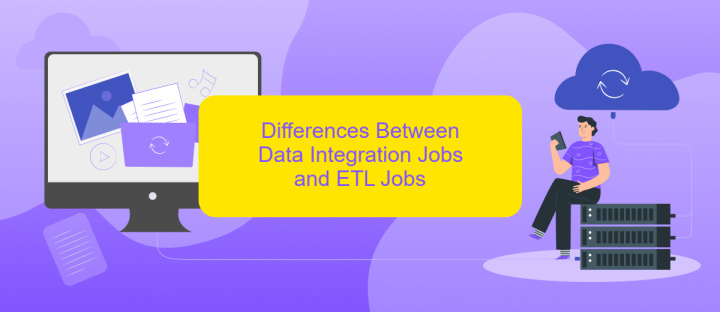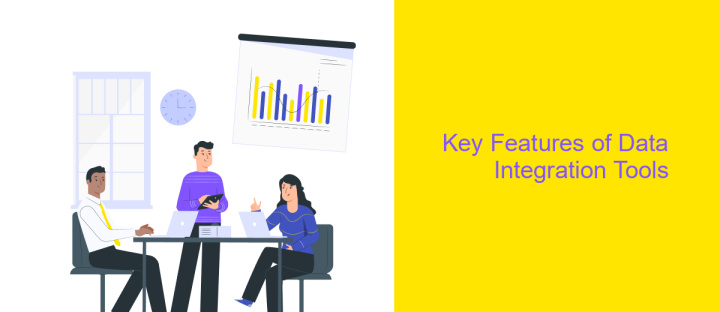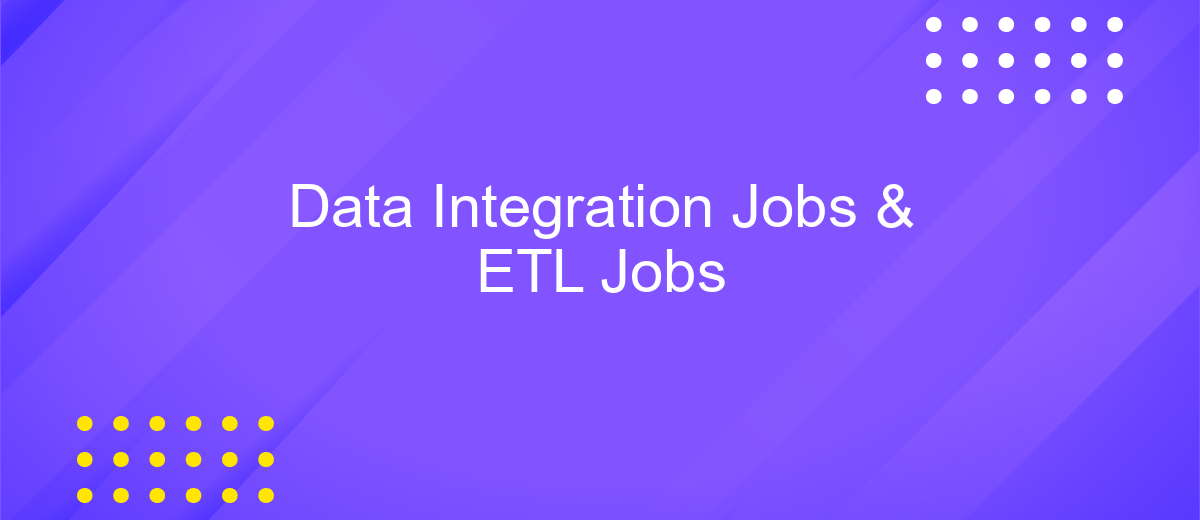Data Integration Jobs & ETL Jobs
In today's data-driven world, the demand for Data Integration and ETL (Extract, Transform, Load) jobs is skyrocketing. These roles are crucial for businesses to seamlessly consolidate data from various sources, ensuring accuracy and accessibility. As organizations increasingly rely on data to drive decisions, professionals skilled in ETL processes and data integration are becoming invaluable assets to any team.
What is Data Integration?
Data integration is the process of combining data from different sources to provide a unified view. This practice is essential for businesses that rely on multiple data sources, such as databases, cloud services, and on-premises systems, to make informed decisions. By integrating data, organizations can ensure consistency, accuracy, and accessibility across various platforms.
- Combines data from multiple sources
- Ensures data consistency and accuracy
- Improves data accessibility
There are various tools and services available to facilitate data integration. For instance, ApiX-Drive is a powerful service that allows users to set up integrations between different applications without requiring extensive technical knowledge. By using such tools, businesses can streamline their data workflows, reduce manual effort, and enhance overall efficiency.
What is an ETL Job?

An ETL (Extract, Transform, Load) job is a crucial process in data integration that involves extracting data from various sources, transforming it into a suitable format, and loading it into a target database or data warehouse. This process ensures that data from disparate systems is consolidated, cleaned, and made ready for analysis. ETL jobs are essential for businesses that rely on accurate and timely data to make informed decisions, as they help in maintaining data integrity and consistency across different platforms.
ETL jobs can be automated using specialized tools and services, such as ApiX-Drive, which streamline the data integration process. ApiX-Drive offers a user-friendly platform that allows businesses to set up and manage ETL workflows without extensive coding knowledge. By leveraging such tools, organizations can save time, reduce errors, and ensure that their data is always up-to-date and accessible for analysis. This automation is particularly beneficial for companies dealing with large volumes of data from multiple sources.
Differences Between Data Integration Jobs and ETL Jobs

Data Integration Jobs and ETL Jobs are often conflated, but they serve distinct purposes in data management. Understanding their differences is crucial for selecting the right approach for your project.
- Scope: Data Integration Jobs encompass a broader range of activities, including real-time data synchronization, API integrations, and data consolidation from various sources. ETL Jobs, on the other hand, specifically focus on Extracting, Transforming, and Loading data.
- Tools: Data Integration often utilizes specialized platforms like ApiX-Drive, which facilitate seamless API integrations and real-time data flows. ETL processes typically rely on ETL-specific tools like Apache NiFi, Talend, or Informatica.
- Complexity: Data Integration Jobs can be simpler or more complex depending on the integration requirements and the systems involved. ETL Jobs usually involve complex data transformations and are often more resource-intensive.
In summary, while both Data Integration and ETL Jobs aim to streamline data workflows, they cater to different needs and use cases. Choosing between them depends on your specific requirements, such as the need for real-time data updates or intricate data transformations.
Key Features of Data Integration Tools

Data integration tools are essential for businesses aiming to streamline their data management processes. These tools facilitate the seamless merging of data from various sources, ensuring consistency and accuracy across the board. They play a crucial role in enhancing data accessibility and operational efficiency.
One of the key advantages of using data integration tools is their ability to automate complex data workflows. By leveraging these tools, organizations can reduce manual intervention, minimize errors, and save valuable time. Additionally, tools like ApiX-Drive offer user-friendly interfaces that simplify the integration process, making it accessible even to non-technical users.
- Data Transformation: Convert data into the required format.
- Data Cleansing: Identify and rectify errors in the data.
- Real-time Data Integration: Enable immediate data updates.
- Scalability: Handle increasing volumes of data efficiently.
- API Support: Integrate with various applications seamlessly.
In conclusion, data integration tools are indispensable for modern enterprises. They not only enhance data quality and accessibility but also provide a scalable solution to manage growing data needs. With tools like ApiX-Drive, businesses can effortlessly set up and manage their integrations, driving better decision-making and operational efficiency.


Key Features of ETL Tools
ETL tools are essential for extracting, transforming, and loading data from various sources into a unified system. One of the key features of these tools is their ability to handle diverse data formats and sources, ensuring seamless data integration. They offer robust data transformation capabilities, allowing users to cleanse, normalize, and enrich data to meet specific business requirements. Additionally, ETL tools often include scheduling and automation features, enabling regular and timely data updates without manual intervention.
Another critical feature is their user-friendly interface, which simplifies the process of setting up and managing data integration workflows. Tools like ApiX-Drive provide intuitive drag-and-drop interfaces and pre-built connectors for popular applications, reducing the complexity of integration tasks. They also offer real-time data processing and monitoring, ensuring data accuracy and reliability. Furthermore, ETL tools support extensive logging and error-handling mechanisms, making it easier to identify and resolve issues promptly, thereby enhancing overall data quality and consistency.
FAQ
What is Data Integration and why is it important?
What is ETL and how does it differ from Data Integration?
How can I automate Data Integration and ETL processes?
What are some common challenges faced in Data Integration and ETL jobs?
How can I ensure data quality in my Data Integration and ETL processes?
Apix-Drive is a simple and efficient system connector that will help you automate routine tasks and optimize business processes. You can save time and money, direct these resources to more important purposes. Test ApiX-Drive and make sure that this tool will relieve your employees and after 5 minutes of settings your business will start working faster.

